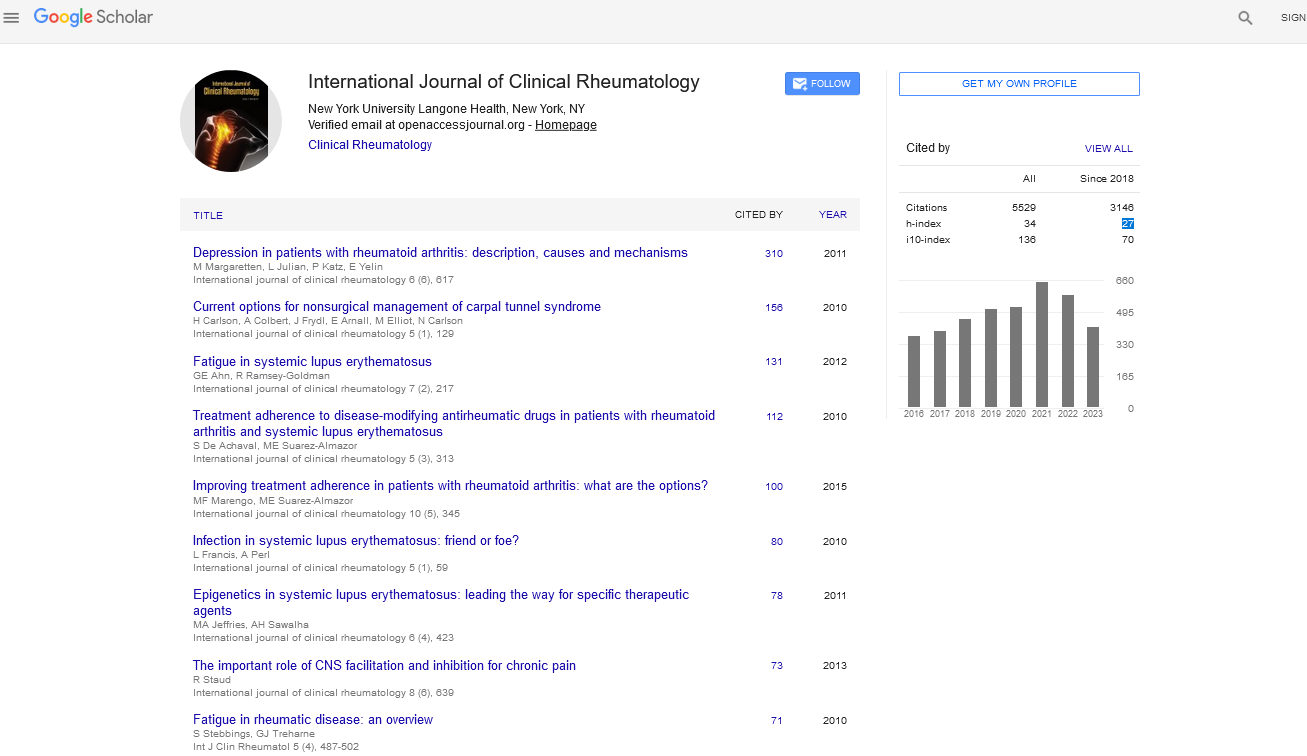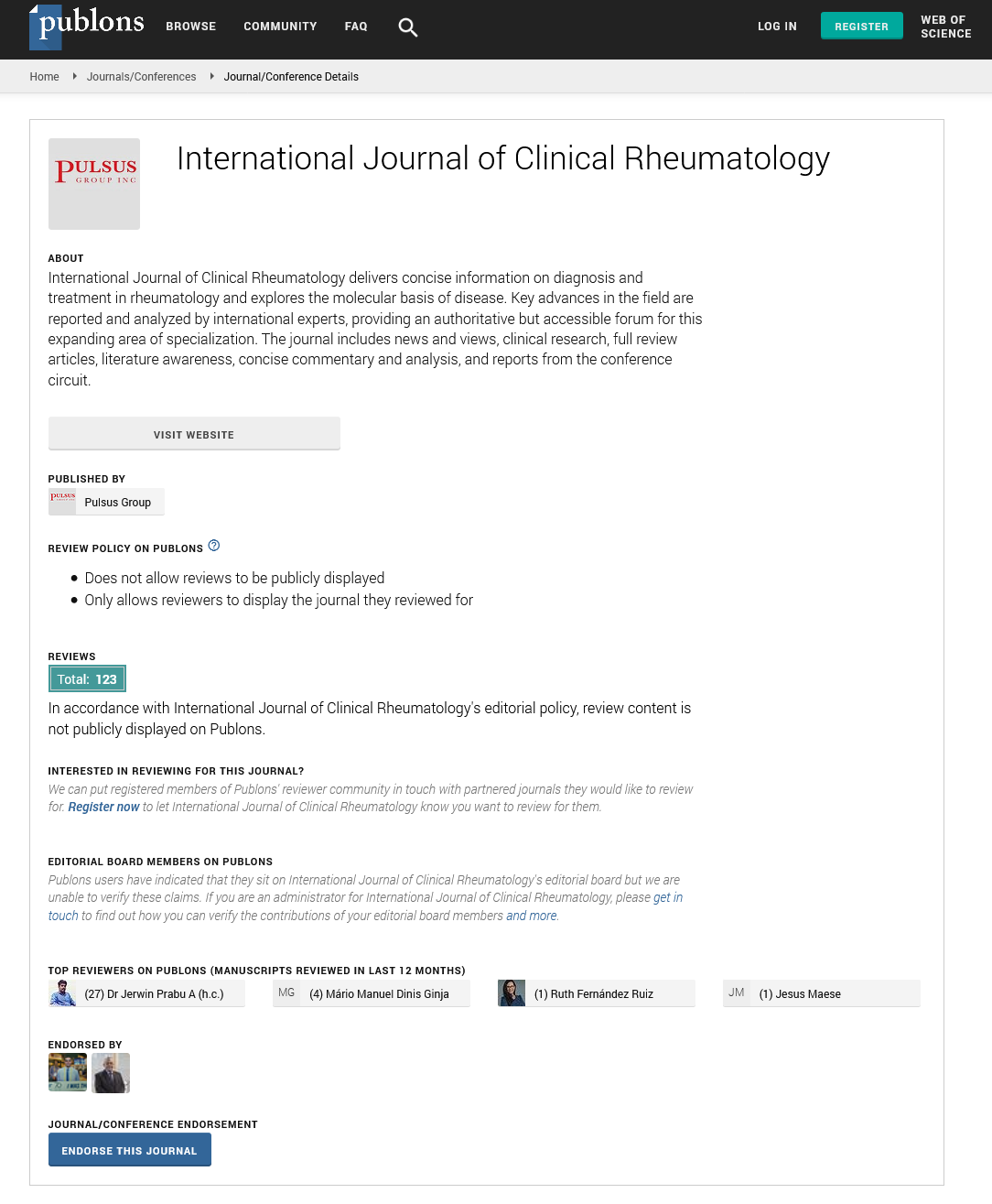Case Report - International Journal of Clinical Rheumatology (2023) Volume 18, Issue 11
Adjusting Therapy: The Changing Scene of Precision Medicine in Rheumatology
Jane A. Mar*
Division of Immunology & Clinical Rheumatology, Department of Medicine in Rheumatology, Stanford, USA
Division of Immunology & Clinical Rheumatology, Department of Medicine in Rheumatology, Stanford, USA
E-mail: jane.a@mar.edu
Received: 02-Nov-2023, Manuscript No. fmijcr-23-120048; Editor assigned: 06- Nov-2023, Pre-QC No. fmijcr-23-120048 (PQ); Reviewed: 20-Nov-2023, QC No. fmijcr-23-120048; Revised: 22-Nov- 2023, Manuscript No. fmijcr-23-120048 (R); Published: 30-Nov-2023, DOI: 10.37532/1758-4272.2023.18(11).349-351
Abstract
As the field of rheumatology evolves, precision medicine has emerged as a transformative approach to tailoring therapies to individual patients. This review explores the dynamic landscape of precision medicine in rheumatology, delving into the latest advancements in molecular diagnostics, biomarkers, and personalized treatment strategies. From the identification of genetic markers to the integration of big data and artificial intelligence, the shifting paradigm of rheumatologic care is examined. The abstract highlights the potential for more effective and targeted interventions, ultimately paving the way for improved outcomes and quality of life for patients with rheumatic diseases.
Keywords
Precision medicine • Rheumatology • Personalized treatment • Molecular diagnostics
Introduction
In the ever-evolving landscape of rheumatology, the advent of precision medicine heralds a paradigm shift in the approach to therapeutic interventions. As our understanding of the intricate molecular mechanisms underlying rheumatic diseases deepens, there is a growing recognition of the need for personalized treatment strategies. This research article aims to explore the dynamic and changing scene of precision medicine in rheumatology, navigating through the latest advancements in molecular diagnostics, biomarkers, and the integration of cutting-edge technologies such as big data and artificial intelligence [1]. The journey towards precision medicine in rheumatology encompasses the identification of genetic markers that offer insights into disease susceptibility and progression. Moreover, the role of biomarkers in predicting treatment response and disease outcomes has become increasingly pivotal. This article delves into the nuanced interplay of these factors, shedding light on the intricate web of molecular signatures that define the rheumatologic landscape.
With the exponential growth of big data and the unprecedented capabilities of artificial intelligence, the scope for refining treatment approaches has expanded significantly. The article explores how these technological advances contribute to a more comprehensive understanding of individual patient profiles, facilitating tailored therapeutic interventions. The implications of these developments extend beyond the laboratory, promising a shift from the traditional one-size-fits-all model to a more nuanced and patient-centered approach [2]. Through a comprehensive review of the literature and an analysis of current trends, this research article aims to provide a synthesized overview of the changing scene of precision medicine in rheumatology. By elucidating the key milestones and challenges in this transformative journey, we aspire to contribute to the ongoing dialogue surrounding personalized care for patients with rheumatic diseases. As precision medicine continues to redefine the boundaries of rheumatologic practice, the potential for improved treatment outcomes and enhanced patient quality of life beckons on the horizon [3].
Genetic markers unveiling the rheumatic code
The first frontier in the landscape of precision medicine in rheumatology involves the intricate world of genetic markers. Unraveling the genetic code associated with rheumatic diseases not only offers a glimpse into the complex etiology of these conditions but also provides invaluable clues for tailoring therapeutic interventions. Recent breakthroughs in genomic research have identified key genetic markers associated with susceptibility to rheumatologic disorders. This subheading delves into the fascinating realm of genetic exploration, exploring how these markers serve as beacons guiding clinicians toward a more nuanced understanding of individual patient risk factors and potential disease trajectories. As we navigate the genetic landscape of rheumatology, the promise of targeted and individualized treatment approaches becomes increasingly tangible, marking a significant stride towards precision medicine in the field [4].
Molecular diagnostics at the forefront
Molecular diagnostics stand as a cornerstone in the evolving field of precision medicine in rheumatology. This subheading plunges into the realm of molecular intricacies, where cutting-edge diagnostic techniques illuminate the pathophysiological underpinnings of rheumatic diseases [5]. From identifying specific gene expressions to analyzing protein signatures, molecular diagnostics empower clinicians with a profound understanding of the molecular landscape. This section explores the role of advanced technologies such as polymerase chain reaction (PCR), next-generation sequencing, and gene expression profiling in unraveling the complexities of rheumatologic conditions. As molecular diagnostics continue to refine our ability to discern subtle molecular variations, the potential for early disease detection and precise treatment stratification comes to the forefront, heralding a new era in the diagnosis and management of rheumatic disorders [6,7].
Result
In the wake of genetic revelations and molecular diagnostics, the focus shifts to the tangible outcomes of precision medicine in rheumatology. This section delves into the results of personalized treatment strategies guided by the wealth of molecular information. By examining how specific genetic markers and molecular signatures influence treatment response, clinicians gain valuable insights into tailoring interventions for optimal outcomes [8]. The subheading explores real-world examples where molecular insights have translated into therapeutic success stories, showcasing the potential of precision medicine to revolutionize patient care. As we bridge the gap between molecular understanding and clinical application, the results obtained from these personalized approaches underscore the transformative impact of precision medicine on the rheumatologic landscape [9,10].
Conclusion
In the closing chapters of this exploration into the changing scene of precision medicine in rheumatology, it becomes evident that we stand at the cusp of a transformative era in patient care. The amalgamation of genetic markers, molecular diagnostics, and personalized treatment strategies marks a paradigm shift from traditional one-size-fits-all approaches. This conclusion reflects on the strides made in deciphering the rheumatic code and highlights the potential for enhanced therapeutic outcomes and improved quality of life for patients.
As the field continues to embrace advancements in technology, from big data analytics to artificial intelligence, the potential for refining and optimizing precision medicine approaches amplifies. The synthesis of molecular insights into tangible results provides a beacon of hope for clinicians and patients alike. Yet, amidst the optimism, challenges persist, from ethical considerations to the integration of these cuttingedge approaches into routine clinical practice. In the grand tapestry of rheumatologic care, precision medicine emerges as a promising thread, weaving together a narrative of individualized, effective, and patient-centered approaches. This concluding section envisions the future trajectory of precision medicine in rheumatology, envisioning a landscape where the rheumatic puzzle is not just decoded but actively managed with unparalleled precision, ushering in a new dawn for the field.
Acknowledgment
None
Conflict of Interest
None
References
- Thorn, Caroline F. Doxorubicin Pathways: Pharmacodynamics and Adverse Effects. Pharmacogenet Genomics. 21, 440-446 (2011).
- Brunelli D, Polonelli T, Benini L. Ultra-low energy pest detection for smart agriculture. IEEE Sens J. 1-4 (2020).
- Crippen TL, Poole TL. Conjugative transfer of plasmid-located antibiotic resistance genes within the gastrointestinal tract of lesser mealworm larvae,Alphitobius diaperinius(Coleoptera: Tenebrionidae). Foodborne Pathog Dis. 7, 907-915 (2009).
- Dwyer, Claire. ‘Highway to Heaven’: the creation of a multicultural, religious landscape in suburban Richmond, British Columbia. Soc Cult Geogr. 17, 667-693 (2016).
- Südfeld S.Post-induction hypotension and early intraoperative hypotension associated with general anaesthesia. Br J Anaesth. 81, 525-530 (2017).
- Makam AN, Nguyen OK. An Evidence-Based Medicine Approach to Antihyperglycemic Therapy in Diabetes Mellitus to Overcome Overtreatment. Circulation. 135, 180-195 (2017).
- Chandalia M, Lutjohann D, von Bergmann K et al. Beneficial effects of high dietary fiber intake in patients with type 2 diabetes mellitus. N Engl J Med. 342, 1392-8 (2000).
- Gething MJ. Role and regulation of the ER chaperone BiP. Seminars in Cell and Developmental Biology. 10, 465-472 (1999).
- Schepers E, Meert N, Glorieux G et al. P-cresylsulphate, the main in vivo metabolite of p-cresol, activates leucocyte free radical production. Nephrol Dial Transplant. 22, 592-596 (2006).
- Ricci Z, Ronco C, Amico GD et al. Practice patterns in the management of acute renal failure in the critically ill patient: an international survey. Nephrol Dial Transplant. 21, 690-696 (2006).
Indexed at, Google Scholar, Crossref
Indexed at, Google Scholar, Crossref
Indexed at, Google Scholar, Crossref
Indexed at, Google Scholar, Crossref
Indexed at, Google Scholar, Crossref
Indexed at, Google Scholar, Cross ref
Indexed at, Google Scholar, Crossref
Indexed at, Google Scholar, Crossref


